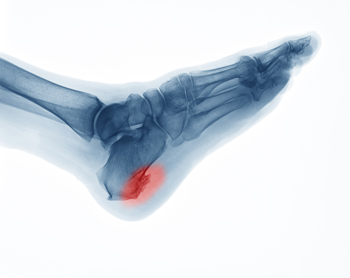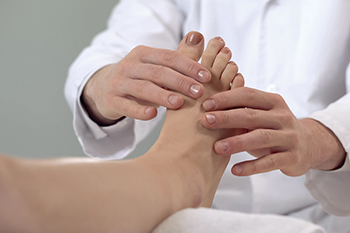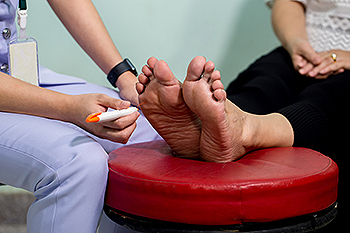Items filtered by date: April 2022
What Is a Heel Spur?

When the heel bone suffers repeated strain or irritation, the body can react by sending extra amounts of calcium to the injury site to protect it. Among the causes are poorly fitting shoes, obesity, arthritis, gait abnormalities, excessive running, and plantar fasciitis. This calcium can build up over time and cause hard, pointy deposits, known as spurs, to develop on the heel bone. Heel spurs can cause pain that may be worse in the morning or more mild and steady throughout the day. Rest or activity can trigger the pain. Heel spurs may occur along with plantar fasciitis, which may cause tenderness and inflammation as well. Not all heel spurs are painful, but those that are can be treated by a podiatrist with a variety of therapies including custom orthotics, physical therapy, cortisol injections, anti-inflammatory medications, or surgery if more conservative methods do not provide relief.
Heel spurs can be incredibly painful and sometimes may make you unable to participate in physical activities. To get medical care for your heel spurs, contact Deborah Rosenfeld from Rosenfeld Podiatry. Our doctor will do everything possible to treat your condition.
Heels Spurs
Heel spurs are formed by calcium deposits on the back of the foot where the heel is. This can also be caused by small fragments of bone breaking off one section of the foot, attaching onto the back of the foot. Heel spurs can also be bone growth on the back of the foot and may grow in the direction of the arch of the foot.
Older individuals usually suffer from heel spurs and pain sometimes intensifies with age. One of the main condition's spurs are related to is plantar fasciitis.
Pain
The pain associated with spurs is often because of weight placed on the feet. When someone is walking, their entire weight is concentrated on the feet. Bone spurs then have the tendency to affect other bones and tissues around the foot. As the pain continues, the feet will become tender and sensitive over time.
Treatments
There are many ways to treat heel spurs. If one is suffering from heel spurs in conjunction with pain, there are several methods for healing. Medication, surgery, and herbal care are some options.
If you have any questions feel free to contact our office located in Marlton, NJ . We offer the latest in diagnostic and treatment technology to meet your needs.
The Dangers of Gangrene
Several chronic diseases that affect the feet – such as diabetes, peripheral artery disease (PAD), and Raynaud’s disease – can lead to a severe deterioration of the tissues that causes gangrene. When blood circulation to an area of the body, such as the feet or legs, is blocked, the tissue breaks down and eventually dies. Symptoms include coldness and numbness; pain, redness, and swelling; a foul odor emanating from the affected area; and discoloration of the skin. If left untreated, gangrene may lead to amputation and can sometimes be fatal. Treatments include antibiotics, removal of dead tissue, hyperbaric oxygen therapy, and removal of the blocked artery, depending on age, physical condition, and severity of the case. If you have any of the conditions listed above, and especially if you are experiencing these symptoms, it is strongly suggested that you consult a podiatrist as quickly as possible for an examination, diagnosis, and treatment plan.
When dealing with systemic disease of the feet, it is extremely important to check the affected areas routinely so that any additional problems are caught quickly. If you have any concerns about your feet and ankles contact Deborah Rosenfeld from Rosenfeld Podiatry. Our doctor will assist you with all of your podiatric needs.
Systemic Diseases of the Feet
Systemic diseases affect the whole body, and symptoms usually are displayed in the feet. This condition can make a patient’s ability to walk unbearable. Systemic diseases include gout, diabetes mellitus, neurological disorders, and arthritis.
Gout – is caused by an excess of uric acid in the body. Common symptoms include pain, inflammation, and redness at the metatarsal/phalangeal joint of the base big toe. Gout can be treated by NSAIDs to relieve pain and inflammation, and other drugs that lower the acid levels in the body.
Diabetes mellitus – is an increase in the level of blood sugar that the body cannot counteract with its own insulin. Failure to produce enough insulin is a factor in Diabetes.
Diabetes of the Feet
Diabetic Neuropathy – may lead to damaged nerves and affect the feet through numbness and loss of sensation.
Peripheral Vascular Disease – can restrict the blood flow to the feet, and often times lead to amputation of the feet.
If you have any questions please feel free to contact our office located in Marlton, NJ . We offer the newest diagnostic and treatment technologies for all your foot and ankle needs.
Are You Suffering From Nerve Damage?
How to Handle Swollen Feet and Ankles
Swelling in the extremities, such as the lower legs, ankles and feet, is called peripheral edema. This buildup of fluids becomes more common as you get older, partially because of gravity, but also from reduced circulation or a more sedentary lifestyle. It also may be the result of standing or walking for long periods of time, or being overweight. Further, certain medications, such as anti inflammatories, antidepressants, and steroids, may cause water retention. Sometimes, just by keeping your legs elevated when lying down, increasing exercise and other activity, losing weight and reducing salt intake, the swelling can be reduced. However, edema may also be a signal of other, more serious conditions, including blood clots, injury, or infection. If swelling in the feet and ankles continues or worsens, it is a good idea to make an appointment with a podiatrist who can properly diagnose the problem and suggest treatment options.

Everyday foot care is very important to prevent infection and other foot ailments. If you need your feet checked, contact Deborah Rosenfeld from Rosenfeld Podiatry. Our doctor can provide the care you need to keep you pain-free and on your feet.
Everyday Foot Care
Often, people take care of their bodies, face and hair more so than they do for their feet. But the feet are a very important aspect of our bodies, and one that we should pay more attention to. Without our feet, we would not be able to perform most daily tasks.
It is best to check your feet regularly to make sure there are no new bruises or cuts that you may not have noticed before. For dry feet, moisturizer can easily be a remedy and can be applied as often as necessary to the affected areas. Wearing shoes that fit well can also help you maintain good foot health, as well as making it easier to walk and do daily activities without the stress or pain of ill-fitting shoes, high heels, or even flip flops. Wearing clean socks with closed shoes is important to ensure that sweat and bacteria do not accumulate within the shoe. Clean socks help to prevent Athlete’s foot, fungi problems, bad odors, and can absorb sweat.
If you have any questions please feel free to contact our office located in Marlton, NJ . We offer the newest diagnostic and treatment technologies for all your foot and ankle needs.



